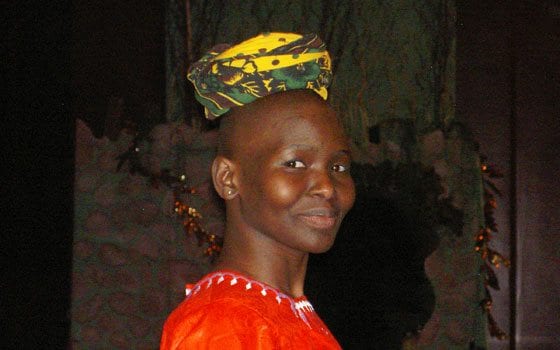
| Elizabeth Siwo-Okundi (left) and Erika Guckenberger, the geography teacher, at McCall Middle School in Winchester, where for the past four years, Siwo-Okundi has presented Orphan Wisdom stories to seventh graders. (Margarita Persico photo) |
For the past four years, Elizabeth Siwo-Okundi has spent her school vacations working at an orphanage in the town of Homa Bay, Kenya.
Part of her job was to care of the children. Another was to make sure they were actually orphans.
She traveled to remote, unpaved areas to visit families of deceased mothers and fathers, to check gravesites, to confirm that the parents were in fact dead and the kids were in fact alone.
“It was definitely hard to see that on a daily basis,” she says. “[But] it also compels [me] to do this work, because it needs to be done — and not just by people who are able to do it, but by people who have the compassion in their heart to do it. The children, they will know if you don’t have love in your heart. They can just look at you and tell.”
When Siwo-Okundi talks about “this work,” she could be referring to Orphan Wisdom Inc., the nonprofit organization that she founded to provide resources to groups supporting orphaned children in the East African country.
She also could be referring to her impassioned preaching and ministry that highlight the connection between social justice and spiritual reconciliation.
Or to the academic challenges she continues to meet — including her selection as this year’s student commencement speaker at Harvard Divinity School, from which she will graduate today with a master’s degree in theology.
In a relatively short period of time, Siwo-Okundi has earned a bachelor’s degree in black studies from Denison University, a master’s of divinity from the Boston University School of Theology, a graduate certificate in African studies, also from BU, and a master’s of theology from Harvard Divinity. In the fall, she plans to begin her pursuit of a doctorate in theology at BU.
She says a number of people have asked her why she’s gone after all those degrees. She has a good answer — marketability and credibility.
“It is very important,” she explains “because the public wants to know what are your credentials for working in this particular area.”
It takes a village
Born in Kendu Bay in Kenya’s Nyanza Province, Siwo-Okundi came to the U.S. with her family when her father accepted a position as a business and economics professor at Wilberforce University in Ohio, the country’s oldest private African American university.
Her mother worked as a registered nurse while Siwo-Okundi attended high school. When her father retired from teaching, he and her mother returned to the village of Kanyadhiang, where he became a farmer.
“My parents have been the ones to set the model for us in terms of helping and giving,” says Siwo-Okundi.
Siwo-Okundi says that helping others is common in her native land. As a child in Kenya, she remembers her family always being surrounded by people doing charity and social service work, people she saw as mentors.
“We would follow them around, would see how did they negotiate in the marketplace, how did they talk with somebody who is ill or somebody who is dying or how did they work with the family who is in a really bad, rough situation,” she recalls. “So we observe what they are doing, and then we imitate … [or] ask.”
That served as her initiation to public service.
“I feel this is a work that I have been called to do,” she says. “I have always had compassion towards children and compassion towards people who are in various situations of challenge.”
There are various situations of challenge killing thousands in present-day Kenya, Siwo-Okundi says — chief among them the HIV/AIDS epidemic and the bloody conflicts that erupted in the aftermath of the nation’s disputed December 2007 presidential election. Both have played a significant role in boosting the number of orphans in Kenya to nearly 2 million, she says.
Four years ago, Siwo-Okundi couldn’t stop thinking about the vulnerable children back in her hometown, where she says nearly every family she knew took care of an orphan. She decided to get involved, traveling back to Kenya to work at an orphanage during the summer of 2004.
After she returned to America, she started raising funds for the orphans through presentations at Boston schools. In 2006, the LeadBoston program, which focuses on social justice, selected her to participate in their leadership program. At the end, they asked her what she planned to do.







